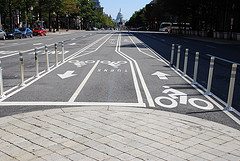16 U.S. Cities Have Installed Special Traffic Lights Just For Bicyclists

(afagen)
For anyone who’s ever stopped confidently into a crosswalk only to have a bicyclist zip by and almost take off your nose, or for those on two wheels shaking a fist at that dang car that just cut you off, we’ve got some good news: American cities are becoming more European, and it has nothing to do with baguettes (mmm, bread). At least 16 U.S. cities now use special traffic lights installed just to direct bike traffic.
Pedestrians, drivers and bikers should all benefit in bike-friendly cities, as the red, yellow and green signals (they look like little bikes, of course) will likely help prevent bike-related traffic accidents.
USA Today says cities like Austin, Denver, Minneapolis, San Francisco, Seattle and Washington D.C. all use the new lights, according to an October study commissioned by the Oregon Department of Transportation and the Federal Highway Administration. European countries like Austria and Sweden have been in this game for a while, as is often the case with simple fixes that make sense.
Bicyclists will be safer, says the study, as they can be at risk when going through an intersection during a yellow light. There’s enough time for a car to clear the intersection in that time, but not bikes. A normal green light for a car might not provide enough time for a biker to go from a stopped position to making it across the intersection safely.
Then there are the times when a car is turning right and a biker is going forward — these new lights give cyclists a bit of a head start so those cars won’t turn right into them.
The kinds of traffic signals vary by city, with some incorporated into the regular flow of traffic and signals for cars, while others must be activated by a bicyclist approaching the intersection.
An engineer who worked on the study said bicyclists will be bound by these traffic signals, but each state right now is responsible for regulating their systems.
Bicycle traffic signals get a green light [USA Today]
Want more consumer news? Visit our parent organization, Consumer Reports, for the latest on scams, recalls, and other consumer issues.

